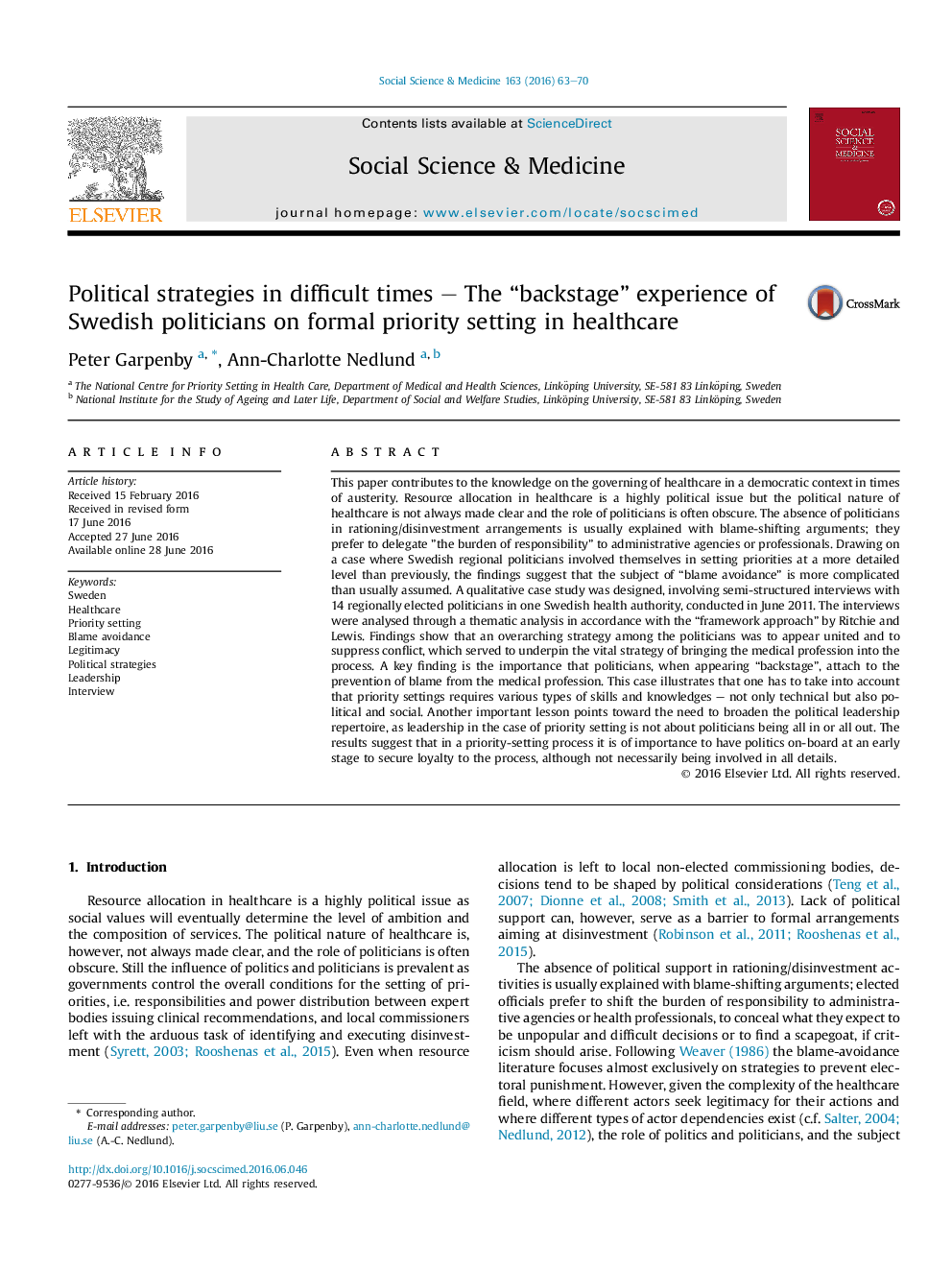| کد مقاله | کد نشریه | سال انتشار | مقاله انگلیسی | نسخه تمام متن |
|---|---|---|---|---|
| 7329601 | 1476006 | 2016 | 8 صفحه PDF | دانلود رایگان |
عنوان انگلیسی مقاله ISI
Political strategies in difficult times - The “backstage” experience of Swedish politicians on formal priority setting in healthcare
ترجمه فارسی عنوان
استراتژی های سیاسی در زمان های دشواری - پشت صحنه تجربه سیاستمداران سوئدی در تنظیم اولویت های رسمی در مراقبت های بهداشتی
دانلود مقاله + سفارش ترجمه
دانلود مقاله ISI انگلیسی
رایگان برای ایرانیان
کلمات کلیدی
سوئد، مراقبت های بهداشتی، تعیین اولویت، اجتناب از سرزنش مشروعیت استراتژی های سیاسی، رهبری، مصاحبه،
ترجمه چکیده
این مقاله به دانش در زمینه حاکمیت مراقبت های بهداشتی در یک زمینه دموکراتیک در زمان ریاضت کمک می کند. تخصیص منابع در مراقبت های بهداشتی یک مسئله بسیار سیاسی است، اما طبیعت سیاسی مراقبت های بهداشتی همیشه مشخص نیست و نقش سیاستمداران اغلب نامطلوب است. عدم وجود سیاستمداران در مقررات سهمیه بندی / عدم سرمایه گذاری معمولا با استدلال های مبنی بر سرزنش توضیح داده می شود؛ آنها ترجیح می دهند که بار مسئولیت را تحریم کنند؟ به ادارات اداری یا حرفه ای. بر اساس یک مورد که در آن سیاستمداران منطقه ای سوئدی خود را در تنظیم اولویت ها در سطح دقیق تر نسبت به گذشته مشارکت می دادند، یافته ها نشان می دهد موضوع اجتناب از سرزنش؟ پیچیده تر از حد معمول است. یک مطالعه موردی کیفی طراحی شده است که شامل مصاحبه نیمه ساختار یافته با 14 سیاستمدار منتخب منطقه ای در یک اداره بهداشت سوئدی در ژوئن 2011 انجام شد. مصاحبه ها با استفاده از یک تحلیل موضوعی مطابق با یک چارچوب رویکرد تجزیه و تحلیل شد. توسط ریتمی و لوئیس. یافته ها نشان می دهد که یک استراتژی کلان در میان سیاستمداران به نظر می رسد متحد و سرکوب مناقشات است که به پایه استراتژی حیاتی از آوردن حرفه پزشکی در روند. یک یافته کلیدی اهمیت است که سیاستمداران هنگام ظاهر شدن به پشت صحنه، به پیشگیری از سرزنش حرفه پزشکی پیوستند. این مورد نشان می دهد که باید توجه داشته باشید که تنظیمات اولویت نیاز به انواع مختلف مهارت ها و دانش ها - نه تنها فنی بلکه سیاسی و اجتماعی است. یکی دیگر از مهم ترین درس ها، اشاره به نیاز به گسترش رپرتوریاسیون رهبری سیاسی است، زیرا رهبری در مورد تنظیم اولویت در مورد سیاستمدارانی نیست که در همه یا همه جا باشند. نتایج نشان می دهد که در یک فرایند تنظیم اولویت، اهمیت دارد که در مرحله اول برای جلوگیری از وفاداری به این فرآیند، سیاست را در نظر بگیریم، گرچه لزوما در تمام جزئیات دخیل نیست.
موضوعات مرتبط
علوم پزشکی و سلامت
پزشکی و دندانپزشکی
سیاست های بهداشت و سلامت عمومی
چکیده انگلیسی
This paper contributes to the knowledge on the governing of healthcare in a democratic context in times of austerity. Resource allocation in healthcare is a highly political issue but the political nature of healthcare is not always made clear and the role of politicians is often obscure. The absence of politicians in rationing/disinvestment arrangements is usually explained with blame-shifting arguments; they prefer to delegate ”the burden of responsibility” to administrative agencies or professionals. Drawing on a case where Swedish regional politicians involved themselves in setting priorities at a more detailed level than previously, the findings suggest that the subject of “blame avoidance” is more complicated than usually assumed. A qualitative case study was designed, involving semi-structured interviews with 14 regionally elected politicians in one Swedish health authority, conducted in June 2011. The interviews were analysed through a thematic analysis in accordance with the “framework approach” by Ritchie and Lewis. Findings show that an overarching strategy among the politicians was to appear united and to suppress conflict, which served to underpin the vital strategy of bringing the medical profession into the process. A key finding is the importance that politicians, when appearing “backstage”, attach to the prevention of blame from the medical profession. This case illustrates that one has to take into account that priority settings requires various types of skills and knowledges - not only technical but also political and social. Another important lesson points toward the need to broaden the political leadership repertoire, as leadership in the case of priority setting is not about politicians being all in or all out. The results suggest that in a priority-setting process it is of importance to have politics on-board at an early stage to secure loyalty to the process, although not necessarily being involved in all details.
ناشر
Database: Elsevier - ScienceDirect (ساینس دایرکت)
Journal: Social Science & Medicine - Volume 163, August 2016, Pages 63-70
Journal: Social Science & Medicine - Volume 163, August 2016, Pages 63-70
نویسندگان
Peter Garpenby, Ann-Charlotte Nedlund,
